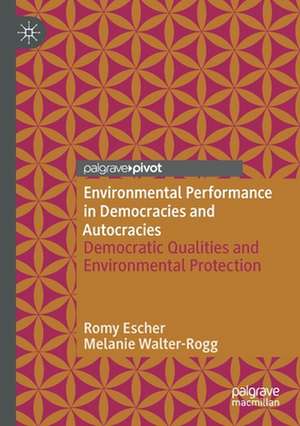Environmental Performance in Democracies and Autocracies: Democratic Qualities and Environmental Protection
Autor Romy Escher, Melanie Walter-Roggen Limba Engleză Paperback – 18 feb 2021
| Toate formatele și edițiile | Preț | Express |
|---|---|---|
| Paperback (1) | 380.45 lei 43-57 zile | |
| Springer International Publishing – 18 feb 2021 | 380.45 lei 43-57 zile | |
| Hardback (1) | 385.84 lei 43-57 zile | |
| Springer International Publishing – 18 feb 2020 | 385.84 lei 43-57 zile |
Preț: 380.45 lei
Nou
Puncte Express: 571
Preț estimativ în valută:
72.80€ • 76.20$ • 60.59£
72.80€ • 76.20$ • 60.59£
Carte tipărită la comandă
Livrare economică 31 martie-14 aprilie
Preluare comenzi: 021 569.72.76
Specificații
ISBN-13: 9783030380564
ISBN-10: 3030380564
Pagini: 162
Ilustrații: XI, 162 p. 58 illus., 32 illus. in color.
Dimensiuni: 148 x 210 mm
Greutate: 0.24 kg
Ediția:1st ed. 2020
Editura: Springer International Publishing
Colecția Palgrave Pivot
Locul publicării:Cham, Switzerland
ISBN-10: 3030380564
Pagini: 162
Ilustrații: XI, 162 p. 58 illus., 32 illus. in color.
Dimensiuni: 148 x 210 mm
Greutate: 0.24 kg
Ediția:1st ed. 2020
Editura: Springer International Publishing
Colecția Palgrave Pivot
Locul publicării:Cham, Switzerland
Cuprins
Chapter 1 – Introduction.- Chapter 2 – Disentangling the effect of the regime type on environmental performance.- Chapter 3 – Democracy qualities and environmental performance in democracies.- Chapter 4 – Democracy qualities and environmental performance in autocracies.- Chapter 5 – Democracy qualities, political corruption and environmental performance.- Chapter 6 – Summary, conclusion and policy implications.
Notă biografică
Romy Escher is a research assistant at the Institute of Political Science of the University of Regensburg, Germany. Her research interests include Climate Policy, Comparative Policy Analysis, and empirical research methods.
Melanie Walter-Rogg is Professor of Political Science and Methodology at the University of Regensburg, Germany. She has co-edited The Political Ecology of the Metropolis (2013) and authored a number of articles and book chapters on Public Policy Analysis, Metropolitan Governance, Urban Democracy as well as Political Culture and Political Behaviour.
Textul de pe ultima copertă
There are considerable differences in environmental performance and outcomes across both democracies and autocracies, but there is little understanding of how levels of democracy and autocracy influence environmental performance. This book examines whether analysing the effects of individual democratic features separately can contribute to a better understanding of cross-national variance in environmental performance. The authors show that levels of social equality in particular, as well as the strength of local and regional democracy, contribute significantly to explaining cross-national variation in environmental performance. On the other hand, a high level of political corruption affects a country’s ability to adopt and implement environmental policies effectively. In exploring the inter-relationship between democratic qualities, political corruption, and environmental performance, this book presents policymakers and political theorists with a clear picture of which aspects ofdemocratic societies are most conducive to producing a better environment.
Romy Escher is a research assistant at the Institute of Political Science of the University of Regensburg, Germany. Her research interests include Climate Policy, Comparative Policy Analysis, and empirical research methods.
Melanie Walter-Rogg is Professor of Political Science and Methodology at the University of Regensburg, Germany. She has co-edited The Political Ecology of the Metropolis (2013) and authored a number of articles and book chapters on Public Policy Analysis, Metropolitan Governance, Urban Democracy as well as Political Culture and Political Behaviour.
Caracteristici
Explores the relationship between democratic features and environmental performance in democracies and autocracies Uses the example of air pollution levels, and tracks performance against a variety of democratic indicators Explains where democratic qualities need to be strengthened to tackle climate change
